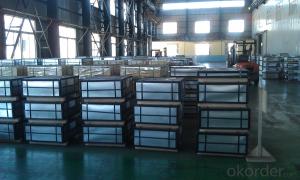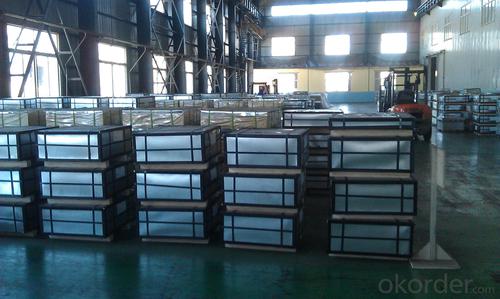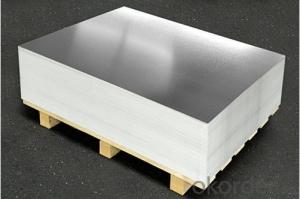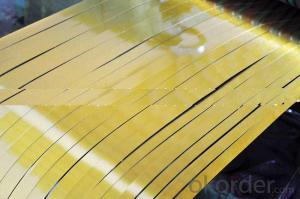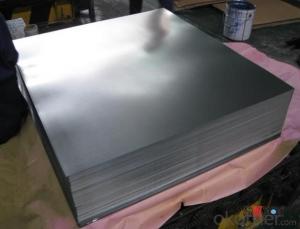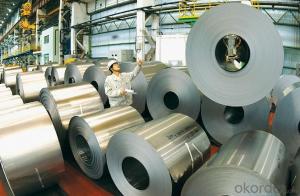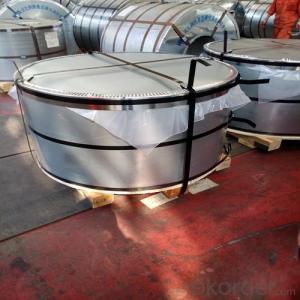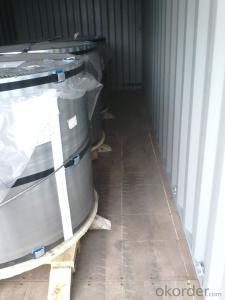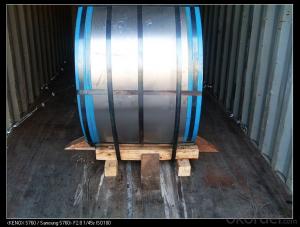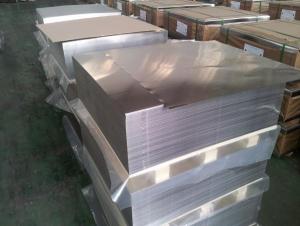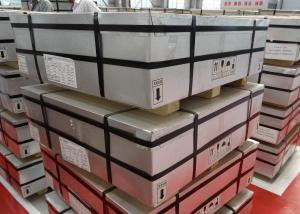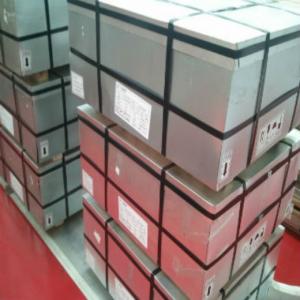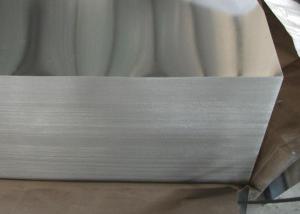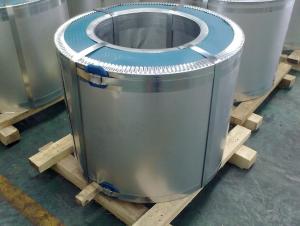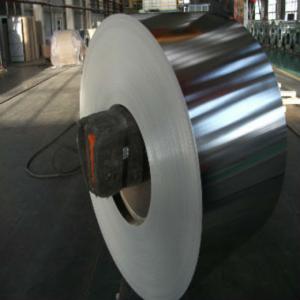Prime Quality ETP of Metal Package of Industrial or Chemical Useage
- Loading Port:
- Shanghai
- Payment Terms:
- TT OR LC
- Min Order Qty:
- 25 m.t.
- Supply Capability:
- 30000 m.t./month
OKorder Service Pledge
OKorder Financial Service
You Might Also Like
Specification
1.Structure of Prime Quality ETP of Metal Package of Industrial or Chemical Useage Description
Electrolytic Tinplate (ETP) is a thin, cold-rolled carbon steel sheet coated with tin. The steel substrate provides the necessary strength and formability for specialty fabrication. The alloy layer provides the bond between the steel and free tin layer. The free tin layer is not only responsible for the attractive bright finish and ease of solderability but is also non-toxic, a factor of vital importance in food packaging.
2.Main Features of the Prime Quality ETP of Metal Package of Industrial or Chemical Useage
Tinplate, thin steel sheet with a coating of tin applied either by dipping in molten metal or by electrolytic deposition; almost all tinplate is now produced by the latter process. Tinplate made by this process is essentially a sandwich in which the central core is strip steel. This core is cleaned in a pickling solution and then fed through tanks containing electrolyte, where tin is deposited on both sides. As the strip passes between high-frequency electric induction coils, it is heated so that the tin coating melts and flows to form a lustrous coat.
3.Prime Quality ETP of Metal Package of Industrial or Chemical Useage Images
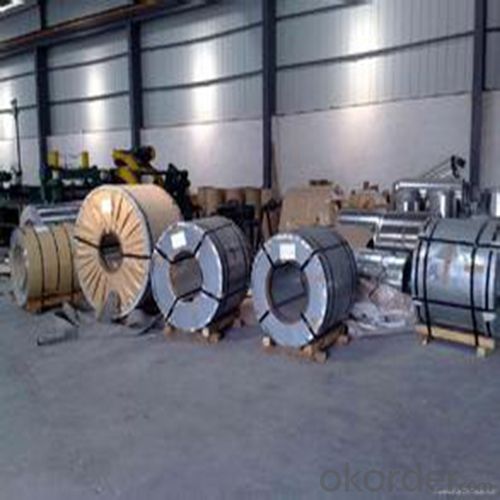
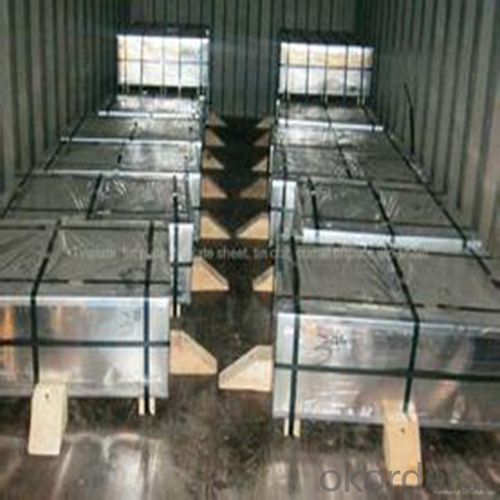
4.Prime Quality ETP of Metal Package of Industrial or Chemical Useage Specification
Specification of :
Standard: ISO 11949 -1995, GB/T2520-2000,JIS G3303,ASTM A623, BS EN 10202
Material: MR,SPCC
Thickness:0.15mm - 0.50mm
Width: 600mm -1150mm
Temper: T1-T5
Annealing: BA & CA
Coil Inner Diameter: 508mm
Weight: 6-10 tons/coil 1~1.7 tons/sheets bundle
Passivation:311
Oil: DOS
Surface: Finish,bright,stone,matte,silver
5.FAQ of Prime Quality ETP of Metal Package of Industrial or Chemical Useage
- What is tinning and how does it work?
Tinning is the process of thinly coating sheets of wrought iron or steel with tin, and the resulting product is known as tinplate. It is most often used to prevent rust.
- Do you only have prime quality tinplate?
We can supply both prime and second quality tinplate.
- Q: What are the main trends in the tinplate industry?
- The main trends in the tinplate industry include a growing demand for sustainable packaging solutions, increased focus on product innovation and customization, the adoption of advanced technology for production efficiency, and a shift towards lightweight and cost-effective packaging materials. Additionally, there is a rising preference for tinplate packaging in the food and beverage sector due to its durability, versatility, and ability to maintain product quality and freshness.
- Q: Can tinplate be used for kitchenware?
- Yes, tinplate can be used for kitchenware. Tinplate is a type of steel coated with a thin layer of tin, which provides corrosion resistance and makes it suitable for food contact applications. It is commonly used for making cans, containers, and other kitchen utensils due to its durability, easy cleaning, and ability to keep food fresh.
- Q: What are the common closure systems for tinplate containers?
- The common closure systems for tinplate containers include screw caps, snap-on lids, and lever lids.
- Q: What are the considerations for handling and storing tinplate coils?
- There are several considerations for handling and storing tinplate coils. Firstly, it is important to handle the coils with care to prevent any damage or deformation. This includes using appropriate lifting equipment, avoiding dropping or dragging the coils, and ensuring a smooth and controlled transfer process. Secondly, the storage environment should be suitable for tinplate coils. They should be stored in a clean, dry, and well-ventilated area to prevent corrosion and rusting. It is recommended to keep the coils away from direct sunlight, extreme temperatures, and moisture. Additionally, proper stacking and organization of the coils is crucial. They should be stacked on flat and stable surfaces, with adequate support and spacing between each coil. Labeling the coils with relevant information such as date of manufacture, size, and grade can aid in efficient inventory management. Lastly, regular inspections should be conducted to identify any potential issues or defects. This includes checking for any signs of corrosion, dents, or scratches that may have occurred during handling or storage. Prompt action should be taken to address any problems to ensure the quality and integrity of the tinplate coils.
- Q: What is the shelf life of tinplate?
- The shelf life of tinplate varies depending on various factors such as storage conditions, type of product packaged, and any protective coatings applied. However, tinplate typically has a long shelf life, often lasting several years, as it is known for its corrosion resistance and ability to protect packaged goods from external contaminants.
- Q: Can tinplate be used for cooking utensils?
- No, tinplate is not suitable for cooking utensils as it can react with certain acidic foods and can be easily scratched or damaged during cooking processes.
- Q: How does tinplate handle exposure to chemicals and solvents?
- Tinplate is generally resistant to exposure to chemicals and solvents due to its protective tin coating, which acts as a barrier against corrosion and chemical reactions. This makes tinplate a reliable choice for packaging and storing various products that may come into contact with different chemicals and solvents.
- Q: Is tinplate affected by moisture or humidity?
- Yes, tinplate is affected by moisture and humidity. Moisture and high humidity levels can cause tinplate to corrode and rust over time. It is important to store and handle tinplate in dry conditions to prevent any potential damage.
- Q: What are the typical transportation requirements for tinplate?
- The typical transportation requirements for tinplate include ensuring proper packaging and protection to prevent damage during handling and shipment. Tinplate is commonly transported in rolled or flat sheets, coils, or fabricated containers, depending on the specific product and its intended use. It is crucial to handle tinplate with care to avoid scratches, dents, or corrosion that could impact its quality. Additionally, proper labeling and documentation are necessary to comply with regulatory and customs requirements during transportation.
- Q: How big is the difference between tinplate and stainless steel 316L?
- 316L is a kind of austenitic stainless steel with excellent corrosion resistance. The tinplate is not comparable. 316L is superior to tinplate in appearance, corrosion resistance, heat resistance and strength. Of course, the price is much higher than that of tinplate.
Send your message to us
Prime Quality ETP of Metal Package of Industrial or Chemical Useage
- Loading Port:
- Shanghai
- Payment Terms:
- TT OR LC
- Min Order Qty:
- 25 m.t.
- Supply Capability:
- 30000 m.t./month
OKorder Service Pledge
OKorder Financial Service
Similar products
Hot products
Hot Searches
Related keywords
